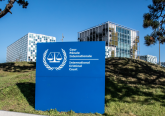
Last week the University of Oxford was fortunate enough to host Ambassador Thomas Pickering who gave the 2012 Fulbright Lecture on the topic of “The Decade Ahead: The US Role in the World”. It would have been difficult to find an individual more qualified for such a task, given the Ambassador’s highly successful four decade long career in the foreign service and considering that he is a man whose (deceptively, given his mental acuity) long life has been spent both in the study of international affairs and in the pursuit of the US’s interests and values within the world. His message comes at a poignant time, given the current academic fervour over the perceived decline of the US in the face the rise of China, and was both sobering and hopeful in tone.
Firstly, in contravention of those scholars (such as Brooks and Wohlforth 2008) who proclaim that the world has experienced its first unipolar moment under the unparalleled dominance of the United States, Ambassador Pickering is of the belief that the US’s unipolar moment was, if it ever existed, so brief as to never have been captured. As such, his fears as to the possible unbalancing effects of the rise of China and other BRIC countries are more tempered than most; since he argues that the notion that world stability depended upon the controlled management of a hegemon was always at least partially mythical. Current fluctuations in the balance of power should not be interpreted as an American “decline” or loss of status or indeed lead to a re-evaluation of the world system from unipolar to multipolar: It has always been multipolar and will continue to be so. Within this evaluation of the world hierarchy, America is set to retain economic and military strength unparalleled by other nations, even if others are ascendant within the world. It is the argument of Ambassador Pickering, therefore, that the US still has the capability, and indeed the duty, to pursue its principles and values on the world stage.
What, then, should these values and principles consist of and how should America undertake to pursue them? Of the lessons Ambassador Pickering believes the US should take from the last decade into the next, foremost appeared the warning that military force is not a good substitute for diplomacy and, moreover, carries so many unintended consequences that it remains an unadvisable policy tool except in the most dire of circumstances – namely, in the face of direct aggression, in order to prevent the proliferation of weapons of mass destruction or in order to put an end to genocide.
As for the challenges that the Ambassador foresaw for the US in the coming decade, they are numerous and daunting. First and foremost was the task of managing the world economy in such a way as to prevent a recurrence of the last four years, a far from simple mission whose success relies much upon the actions of others – particularly European leaders whose reliability has been called into question in recent months.
Secondly, he posited the security challenge posed by the extended Middle East, “from Gibraltar to Afghanistan”, where current upheavals, while no doubt welcome, threaten to destabilize an already precarious and complex region whose quarrels have the habit of drawing in much of the rest of the world. While acknowledging that there was no one formula to resolve the multifarious problems of this area of the world, a resolution to the Arab-Israeli conflict was cited as the most pressing and possibility-laden area on which to concentrate. In particular, Ambassador Pickering advocated that the US was in the position to dictate the boundaries within which a future peace agreement was to be found and that this should involve a reformulating of its position towards Israel, an end to its unlimited tolerance and protection for that nation and a refusal to accept a situation of permanent occupation for Palestine as Israel’s policy for peace.
Linked to the problem of the Israel-Palestine conflict is the possibility of proliferation of nuclear weapons to Iran; in the Ambassador’s mind an undesirable development which the US must lend all of its diplomatic weight to prevent. Cautioning against a military response, as capable only of delaying any nuclear program by a couple of years rather than preventing it entirely and likely to fortify the cause of nuclear hawks within Iran, Ambassador Pickering believes that a diplomatic solution is possible and should be pursued with commitment on the part of the US.
Thirdly, the Ambassador argued that the US needed to recognise the interlinked and webbed nature of contemporary global security challenges and to modify its policies accordingly. The interwoven issues of climate change and energy security, of nuclear proliferation and disarmament, and of poverty, resource scarcity, forced migration, failed states and terrorism present complex nexuses of security threats. However, according to Ambassador Pickering, their very interlinked nature means that, from the point of view of a diplomat, there is a large degree of leverage available across the range of issues which is frequently ignored but may be the key to their solution, at least from an intergovernmental perspective. The current policy of the US to “throw money at these issues” is therefore failing to capitalise upon the US’s possible means to resolve many of these problems. The key, he suggested, was partnership between the US and other actors and a communal rethinking of how to address the security-development nexus.
Ambassador Pickering concluded by stating that he believed that there was no single paradigm capable of directing how the US should act in the world within the next decade but that “engagement” must be the essence of all policies. A firm believer in diplomacy, the Ambassador’s doctrine appears validated by the previous decade, where ten years of war and occupation have merely resulted in miring the US in two unwinnable wars in the Middle East, persuading non-nuclear countries that security lies in acquirement of nuclear arms, and the disillusioning of much of the world of the the trust that the US is a force for good on the world stage. The ambassador, however, is firmly of the belief that the US still has much to offer the world, in principles, values, prosperity and peace: It simply needs to break with the mistakes of the last decade and rethink how to pursue these goals in the next. Let us hope that the Ambassador’s hopeful vision is an achievable one.







No Comment